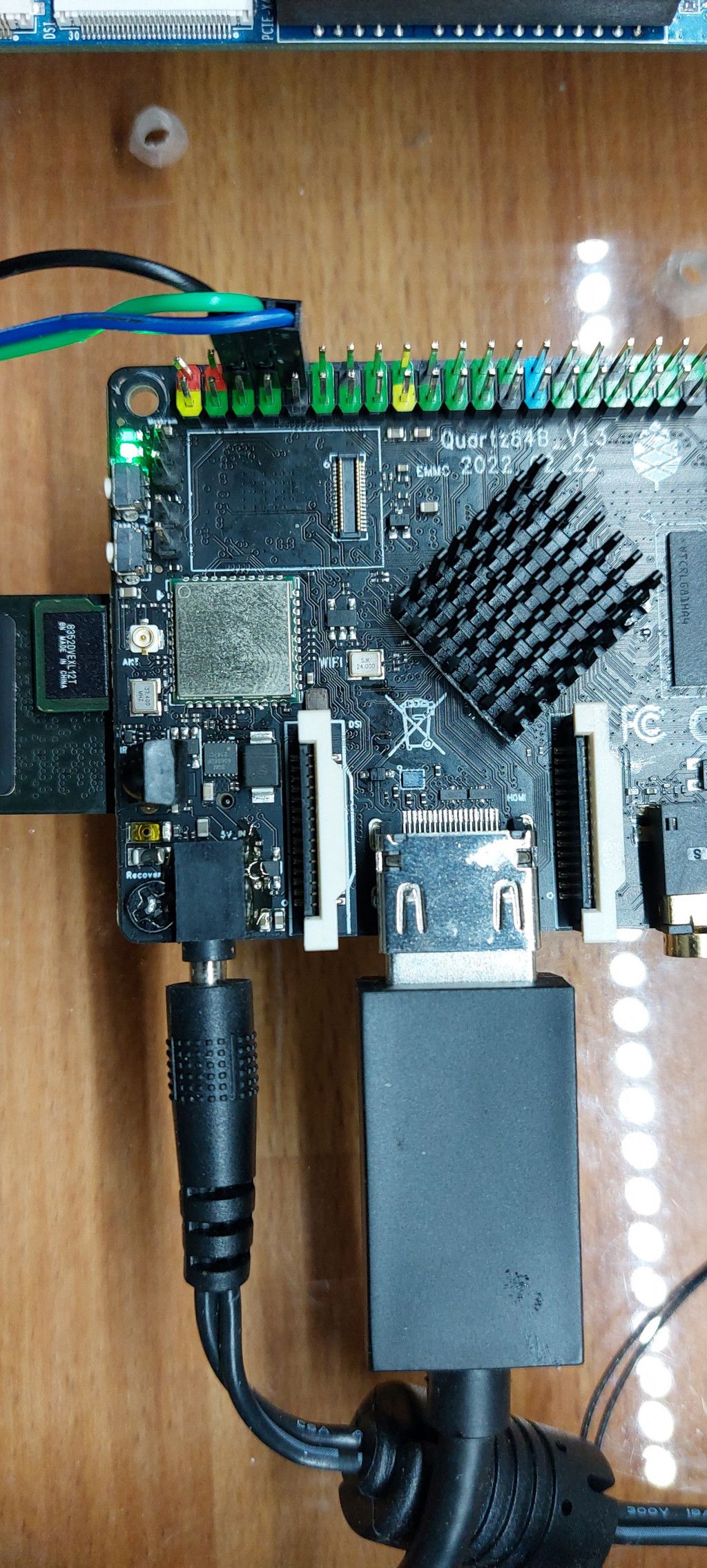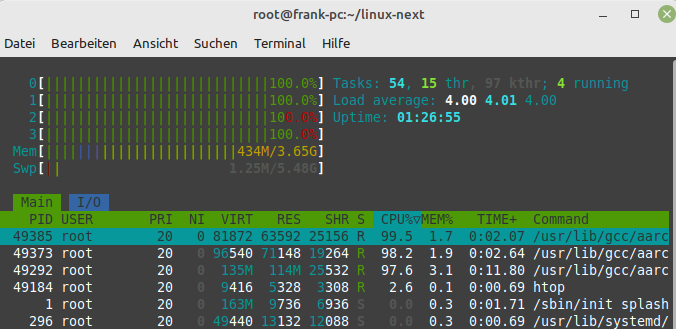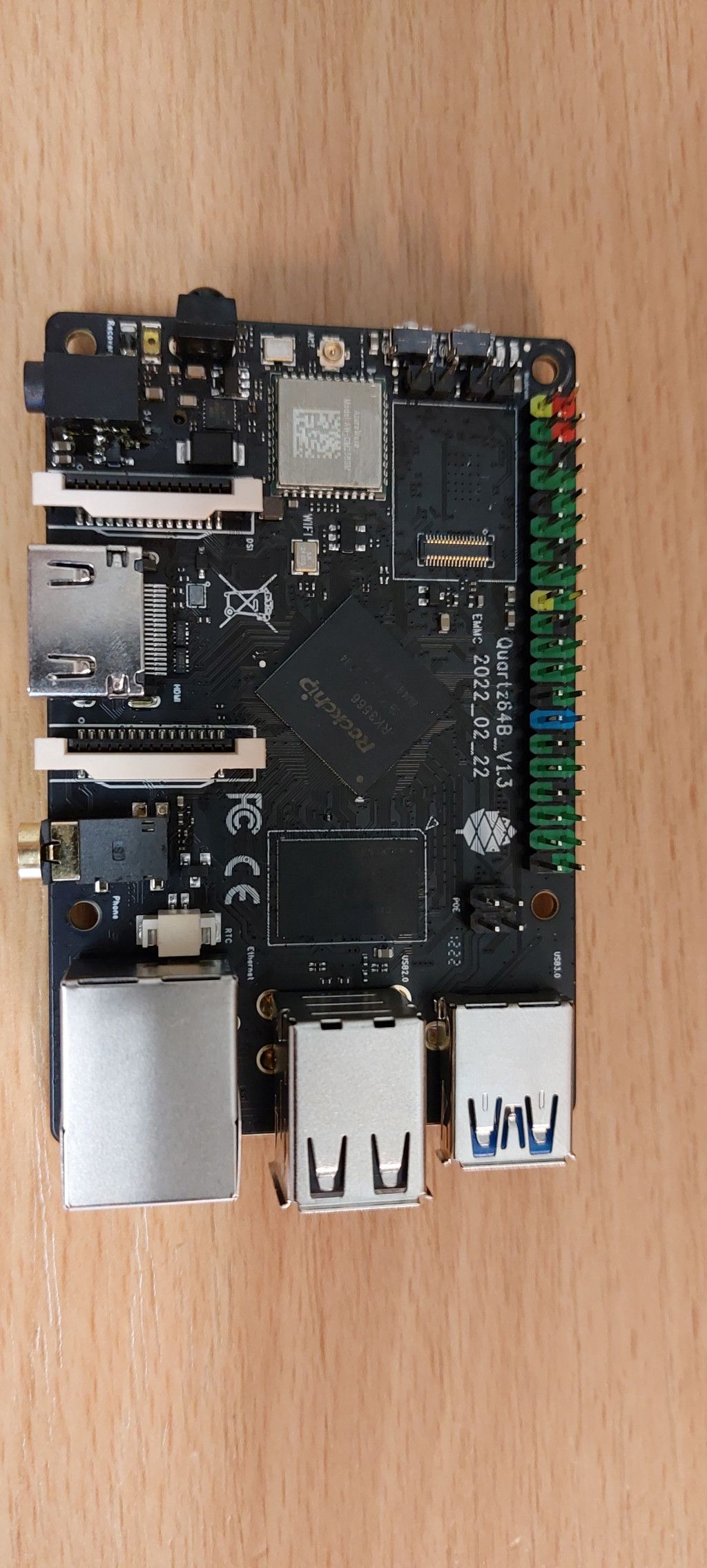Was geht?
Funktion
Status
Bemerkung
cpufreq
ok
*3
UART
ja
*5
LAN
hat Fehler
*1
USB3
ja
ca. 210MB/s *2
PCIe
ja
ca. 296 MB/s, ist mit einer Lane angeschlossen *4
HDMI
nein
LAN *1
root@debian:~# iperf3 -c 192.168.3.213
Connecting to host 192.168.3.213, port 5201
[ 5] local 192.168.3.10 port 39124 connected to 192.168.3.213 port 5201
[ ID] Interval Transfer Bitrate Retr Cwnd
[ 5] 0.00-1.00 sec 434 KBytes 3.55 Mbits/sec 61 2.83 KBytes
[ 5] 1.00-2.00 sec 475 KBytes 3.89 Mbits/sec 44 2.83 KBytes
[ 5] 2.00-3.00 sec 396 KBytes 3.24 Mbits/sec 43 2.83 KBytes
[ 5] 3.00-4.00 sec 318 KBytes 2.61 Mbits/sec 40 2.83 KBytes
[ 5] 4.00-5.00 sec 315 KBytes 2.58 Mbits/sec 31 2.83 KBytes
[ 5] 5.00-6.00 sec 396 KBytes 3.24 Mbits/sec 46 2.83 KBytes
[ 5] 6.00-7.00 sec 396 KBytes 3.24 Mbits/sec 43 2.83 KBytes
[ 5] 7.00-8.00 sec 396 KBytes 3.24 Mbits/sec 43 1.41 KBytes
[ 5] 8.00-9.00 sec 396 KBytes 3.24 Mbits/sec 47 2.83 KBytes
[ 5] 9.00-10.00 sec 317 KBytes 2.59 Mbits/sec 39 2.83 KBytes
- - - - - - - - - - - - - - - - - - - - - - - - -
[ ID] Interval Transfer Bitrate Retr
[ 5] 0.00-10.00 sec 3.75 MBytes 3.14 Mbits/sec 437 sender
[ 5] 0.00-10.00 sec 3.67 MBytes 3.08 Mbits/sec receiver
iperf Done.
root@debian:~# iperf3 -R -c 192.168.3.213
Connecting to host 192.168.3.213, port 5201
Reverse mode, remote host 192.168.3.213 is sending
[ 5] local 192.168.3.10 port 39130 connected to 192.168.3.213 port 5201
[ ID] Interval Transfer Bitrate
[ 5] 0.00-1.00 sec 112 MBytes 941 Mbits/sec
[ 5] 1.00-2.00 sec 112 MBytes 942 Mbits/sec
[ 5] 2.00-3.00 sec 112 MBytes 942 Mbits/sec
[ 5] 3.00-4.00 sec 112 MBytes 942 Mbits/sec
[ 5] 4.00-5.00 sec 112 MBytes 942 Mbits/sec
[ 5] 5.00-6.00 sec 112 MBytes 942 Mbits/sec
[ 5] 6.00-7.00 sec 112 MBytes 942 Mbits/sec
[ 5] 7.00-8.00 sec 112 MBytes 942 Mbits/sec
[ 5] 8.00-9.00 sec 112 MBytes 942 Mbits/sec
[ 5] 9.00-10.00 sec 112 MBytes 942 Mbits/sec
- - - - - - - - - - - - - - - - - - - - - - - - -
[ ID] Interval Transfer Bitrate Retr
[ 5] 0.00-10.00 sec 1.10 GBytes 943 Mbits/sec 370 sender
[ 5] 0.00-10.00 sec 1.10 GBytes 942 Mbits/sec receiver
iperf Done.
USB3 *2
root@debian:~# lsusb
Bus 002 Device 003: ID 046d:c52f Logitech, Inc. Unifying Receiver
Bus 002 Device 001: ID 1d6b:0001 Linux Foundation 1.1 root hub
Bus 001 Device 001: ID 1d6b:0002 Linux Foundation 2.0 root hub
Bus 006 Device 002: ID 152d:0578 JMicron Technology Corp. / JMicron USA Technology Corp. JMS578 SATA 6Gb/s
Bus 006 Device 001: ID 1d6b:0003 Linux Foundation 3.0 root hub
Bus 005 Device 001: ID 1d6b:0002 Linux Foundation 2.0 root hub
Bus 004 Device 001: ID 1d6b:0003 Linux Foundation 3.0 root hub
Bus 003 Device 002: ID 046d:c31c Logitech, Inc. Keyboard K120
Bus 003 Device 001: ID 1d6b:0002 Linux Foundation 2.0 root hub
Disk /dev/sda: 238.47 GiB, 256060514304 bytes, 500118192 sectors
Disk model: Generic
Units: sectors of 1 * 512 = 512 bytes
Sector size (logical/physical): 512 bytes / 512 bytes
I/O size (minimum/optimal): 512 bytes / 512 bytes
Disklabel type: gpt
Disk identifier: 05AB264B-738E-47BB-9F67-5C04CC24A736
Device Start End Sectors Size Type
/dev/sda1 2048 500118158 500116111 238.5G Linux filesystem
root@debian:~# mount /dev/sda1 /mnt/sda/
root@debian:~# cd /mnt/sda
root@debian:/mnt/sda# dd if=/dev/zero of=sd.img bs=4M count=4096 oflag=direct
4096+0 records in
4096+0 records out
17179869184 bytes (17 GB, 16 GiB) copied, 81.5051 s, 211 MB/s
--------------
root@debian:/# lsusb
Bus 002 Device 003: ID 046d:c52f Logitech, Inc. Unifying Receiver
Bus 002 Device 001: ID 1d6b:0001 Linux Foundation 1.1 root hub
Bus 001 Device 001: ID 1d6b:0002 Linux Foundation 2.0 root hub
Bus 006 Device 003: ID 04e8:61f5 Samsung Electronics Co., Ltd Portable SSD T5
Bus 006 Device 001: ID 1d6b:0003 Linux Foundation 3.0 root hub
Bus 005 Device 001: ID 1d6b:0002 Linux Foundation 2.0 root hub
Bus 004 Device 001: ID 1d6b:0003 Linux Foundation 3.0 root hub
Bus 003 Device 002: ID 046d:c31c Logitech, Inc. Keyboard K120
Bus 003 Device 001: ID 1d6b:0002 Linux Foundation 2.0 root hub
root@debian:/mnt/sda# dd if=/dev/zero of=sd.img bs=4M count=4096 oflag=direct
4096+0 records in
4096+0 records out
17179869184 bytes (17 GB, 16 GiB) copied, 83.7618 s, 205 MB/s
cpufreq *3
root@debian:~# cat /sys/devices/system/cpu/cpu*/cpufreq/cpuinfo_max_freq
1800000
1800000
1800000
1800000
root@debian:~# cat /sys/devices/system/cpu/cpu*/cpufreq/cpuinfo_cur_freq
1416000
1416000
1416000
1416000
root@debian:~# cat /sys/devices/system/cpu/cpu*/cpufreq/cpuinfo_cur_freq
1800000
1800000
1800000
1800000
root@debian:~# cat /sys/devices/system/cpu/cpu*/cpufreq/cpuinfo_cur_freq
1416000
1416000
1416000
1416000
PCIe NVMe SSD *4
root@debian:/mnt/nvme# dd if=/dev/zero of=sd.img bs=4M count=4096 oflag=direct
4096+0 records in
4096+0 records out
17179869184 bytes (17 GB, 16 GiB) copied, 58.0362 s, 296 MB/s
Das soll laut Peter die maximal mögliche Geschwindigkeit der PCIe Schnittstelle sein. Diese Schnittstelle ist nur mit einer Lane an den Prozessor angeschlossen!
UART
Bitte drauf achten, diese Schnittstelle arbeitet mit Level Shifting, was billige Adapter oft nicht abkönnen. Habe ich hier im Beitrag ausführlich erklärt, mit passenden Adapter, wenn es so wie bei mir nicht funktionierte.





